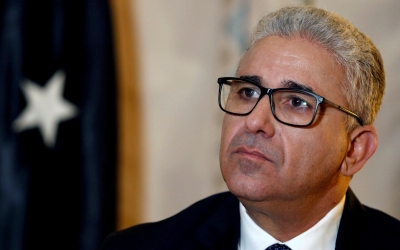Libya losing $60m a day in oil shutdown, says minister

Libya is losing tens of millions of dollars a day from the shutdown of its oil facilities, while global prices are at their highest in years, the country's oil minister told AFP.
Protesters have in recent weeks blocked oil facilities as part of a dispute between rival political factions. The North African country of seven million people has been ravaged by instability and conflict since the 2011 overthrow of dictator Muammar Gaddafi.
"Production has fallen by about 600,000 barrels a day," which is about half, Oil and Gas Minister Mohammed Oun said in an interview at his office in Tripoli.
"Calculating the sale price at $100 a barrel, losses are at least $60m daily," he said.
The protesters' blockade means Libya has been unable to fully capitalise on a rise in crude prices since Russia's invasion of Ukraine exacerbated supply concerns in what was already a tight market.
New MEE newsletter: Jerusalem Dispatch
Sign up to get the latest insights and analysis on Israel-Palestine, alongside Turkey Unpacked and other MEE newsletters
In late February, the price of Brent soared to a 14-year high of $140 a barrel, though it has since retreated. On Friday, the US benchmark West Texas Intermediate crude traded above $106 per barrel. The price of Brent crude exceeded $109 a barrel.
The Libyan shutdowns follow the selection in February of a new prime minister, Fathi Bashagha, by Libya's eastern-based parliament, in a direct challenge to Tripoli-based interim Prime Minister Abdul Hamid al-Dbeibah.
Dbeibah has refused to cede power to Bashagha, a former interior minister in Libya's previously UN-recognised government. The stand-off comes after Libya failed to hold long-awaited presidential elections in December amid political infighting and squabbling over election laws.
'Libya loses its place'
The closure of several of the country's oil facilities over political differences is not new, and Libyan officials and analysts have blamed the recent blockade on forces aligned with eastern-based commander Khalifa Haftar, who supports Bashagha.
Haftar, who is backed by Russia, led a failed offensive in 2019-20 to capture the capital city, Tripoli. His militias continue to hold sway in much of Libya's east, where the majority of oil facilities are located.
Libya sits on Africa's largest known oil reserves. Before the 2011 uprising, its oil production was between 1.5 million and 1.6 million barrels per day. Since the start of the conflict, output has wavered, sinking to near zero at several points in the past decade.
"The closures affect the petroleum infrastructure, especially the pipelines, harming Libya's reputation and leading to a loss of confidence on the international market," said Oun.
"When you deliver a given quantity to a customer and the next day you can't, Libya loses its place" in that market, he said.
Washington's embassy in Tripoli on Wednesday said it was "deeply concerned" by the Libyan oil closures and said they should end immediately.
In an interview with the Financial Times, Oun previously said the shutdowns could not have happened without the cooperation of the Petroleum Facilities Guard, which is under Haftar's control.
Oun said the oil ministry was "in contact with actors in different regions" to try to end the shutdown.
Middle East Eye delivers independent and unrivalled coverage and analysis of the Middle East, North Africa and beyond. To learn more about republishing this content and the associated fees, please fill out this form. More about MEE can be found here.


